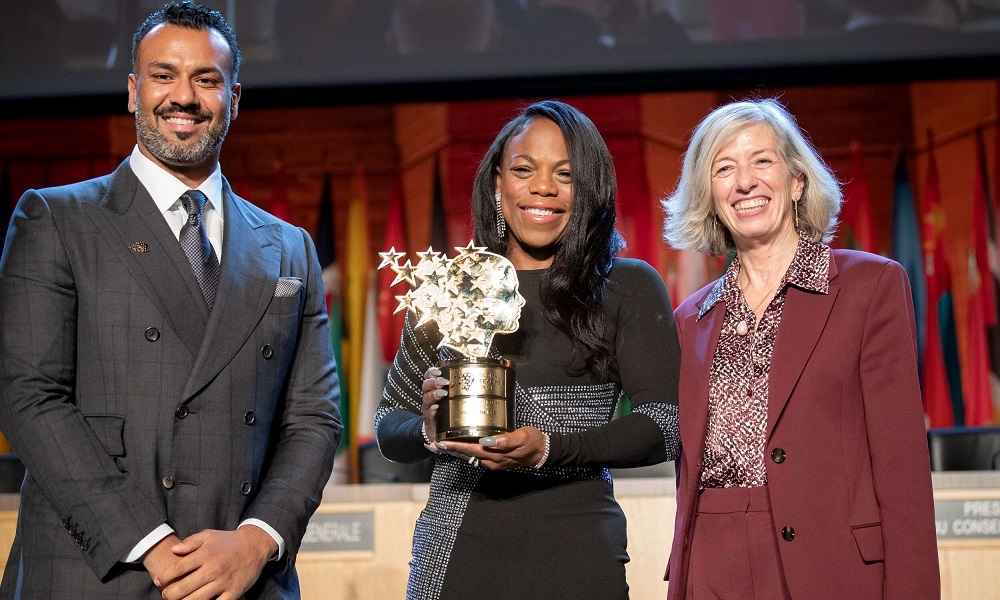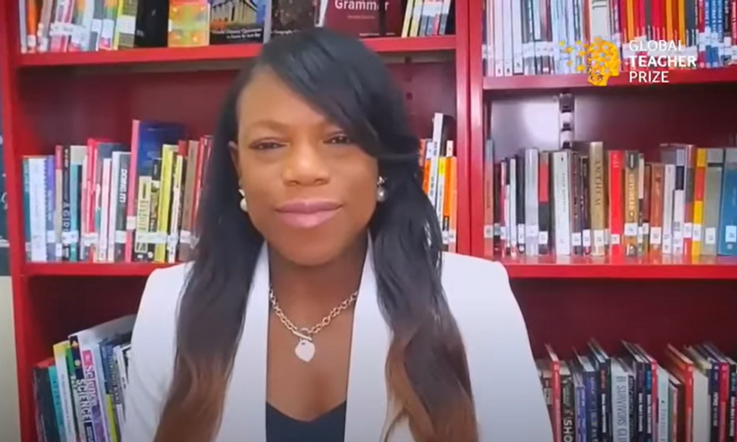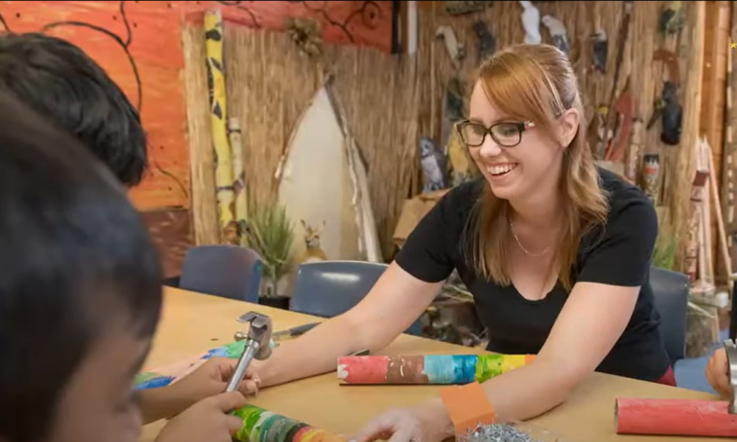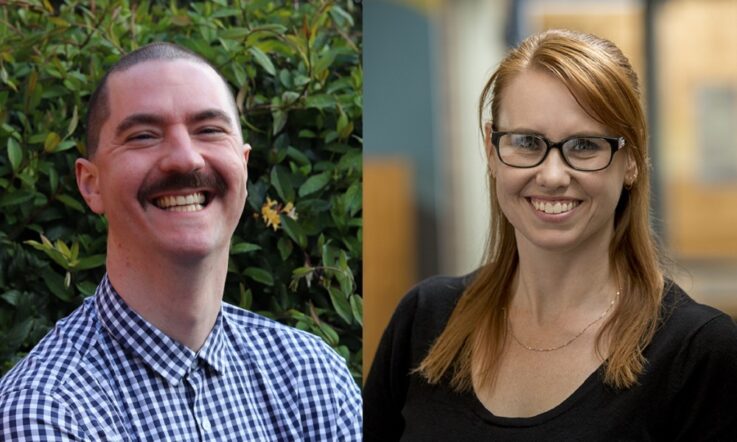The Global Teacher Prize is an annual US $1 million award to an outstanding teacher, presented by the Varkey Foundation in partnership with UNESCO. At the end of last year, Keishia Thorpe was announced as the 2021 winner. Thorpe, who teaches English to students in their final year of secondary school, was selected from over 8000 nominations.
In today’s Q&A, she joins Teacher to share more about the work she’s doing to improve student outcomes in her school setting and wider community.
Can you tell us about your school context and your role there?
I teach English to 12th Grade students who are English Language Learners (ELLs) at the International High School Langley Park, Bladensburg, Maryland, United States. My students are first-generation Americans, immigrants or refugees who are mainly from Africa, the Middle East, the Caribbean, and South, and Central America. Around 95 per cent of them identify as low income, while many of them struggle to overcome language and cultural barriers.
As there is a growing need to recognise students' identities and how they interact in 21st Century classrooms, I approach this from a Social Emotional Learning (SEL) and social justice perspective, implementing culturally responsive teaching that better connects students to what they are learning. Education is not a ‘one-size-fits-all’ solution, so I ensure all my students are represented in my curricula, by integrating lessons and texts that represent their cultures and their individual ways of learning. This approach works – resulting in increased student attendance in class, more engagement and improved grades. It has helped me to build authentic relationships with students and improve communication with parents.
In your acceptance speech, you said ‘every child needs a champion, an adult who will never ever give up on them; who understands connection and insists they become the very best they can possibly be.’ What strategies do you have for building strong relationships with your students? What impact does this support have on their learning and wellbeing?
I believe in an evidence-based approach to learning and research has shown that students and teachers alike benefit greatly from SEL integration. These SEL and culturally responsive practices can combat lack of motivation, dropout rates, and poor academic achievement with my students. I put my students’ cultural and social identities at the forefront of my teaching. It’s important to recognise the inequities they face, their differences and create a safe environment where they feel liberated to take charge of their learning and collaborate with each other to solve problems.
I also use Project Based Learning (PBL) as one of the most effective approaches to assess my students, based on their overall ability to master academic and SEL, rather than just rely on test scores. This allows me to meet their diverse needs and interests and appropriately challenge them. From the success of this approach, I created a resource guide called The Playbook, where I document effective practices for ELLs after years of observing and collecting data on how they learn and what they need. I have shared this with teachers nationally and in my school district to help ELL students improve their levels of proficiency in English.
At your school, you have redesigned the English curriculum to make it more culturally relevant. On a real practical level, how did you do this? What elements were most important to redesign? Were students involved in the process? How has the redesign improved learning at your school?
I approach curriculum design from a global perspective. I aligned what I teach to students' culture and to current events in society. Two innovative ideas I introduced yielded positive outcomes for my students – a new Language Exchange Program I developed in partnership with schools in the Bahamas and taking a social justice approach in my curriculum redesign to include exploring student’s identities and to foster civic responsibility.
In particular, I encourage my students to tell their stories; explore the role of men and women in society; analyse how literature teaches us about just and unjust societies; research the identity and struggles of other minority groups and focus on social justice from another perspective. Students choose an issue in their community, conduct research and interviews, and write letters to community and school leaders with proposals for change.
I also adopted the Global Classroom DC curriculum under the Model United Nations USA. It was wonderful to see my students attend the Model UN conference to collaborate with their peers on global topics relating to the Sustainable Development Goals of 2030. This taught my students to amplify their own voices.
Can you tell me about the work you do to help your students access college scholarships? Do you have any support from other staff members with this work? Do you work directly with colleges?
For the students that I teach in the classroom, I usually dedicate the first unit of my curriculum to help them craft their personal statement essays for their college applications and guide them through the process of applying to college and how to access various scholarships. I was proud to help senior students, in 2018-19 alone, win over US$6.7 million in scholarships to 11 different colleges with almost 100 per cent of them going tuition-free.
My school and fellow teachers have been incredibly supportive as I proposed the idea to redesign the 12th Grade curriculum for the English department to make it culturally relevant for our students. With everyone’s involvement, we helped students feel more valued, affirmed, and safe in the classroom, as well as better connected to the content. As a result of these interventions, our English Language Learners have shown a 40 per cent increase in their reading. More than 50 per cent of the students were able to receive college credit for the course and I was proud to help my school to graduate its first group of students
Additionally, after graduating from college, my twin sister, Dr Treisha Thorpe and I established the US Elite International Track and Field, Inc., a registered non-profit giving student-athletes across the globe an opportunity to use their talents as a vehicle to access fully-funded scholarships to US colleges and universities.
Our Liaison International Scholarship Program’s mission is to help students from low-to-moderate income households and those considered ‘at risk’ to access higher education. We want to help them graduate college debt-free, helping eliminate their barriers to success. We have carefully built a network of US college coaches with whom student-athletes are paired, with a view to earning full scholarships. To date, we have helped over 500 students gain full athletic track and field scholarships. US Elite has achieved over 90 per cent college graduation of student members, approximately 20 per cent pursued a Master’s degree, and eight per cent a postgraduate degrees.
What do you hope to see at your school, in terms of student outcomes, in the near future?
I want to help even more disadvantaged students realise their potential and have the best start in life through going on to attend college. Education is a human right and everyone, regardless of background, should be able to access it. Students from the poorest backgrounds have been the hardest hit by everything – from lack of opportunity to the coronavirus pandemic. I want to integrate more services into my non-profit organisation so I can help students worldwide access higher education.
Anything else you’d like to add?
I want to thank Sunny Varkey and the Varkey Foundation for creating this unique platform – the Global Teacher Prize – that gives teachers a voice so they can tell their stories and share their experiences to a worldwide audience. Ultimately, we all need to work together to raise the status of the teaching profession. Only by backing teachers can we build a better tomorrow.
The other top 10 finalists for 2021 were Ana Maria Stelman from Argentina, Breanna Heels from Canada, Bryant Acar from the Philippines, Diana Lorena Rubio from Mexico, Evans Odei from Ghana, Juline Rault from France, David Swanston from the UK, Rebecca West from Australia and Soraya Motaharnia from Iran. You can find out more about all the finalists on the Global Teacher Prize website.
Keishia Thorpe says: ‘I want to help even more disadvantaged students realise their potential and have the best start in life through going on to attend college’.
As a secondary school teacher, can you think of an example of when you have helped a student to realise their potential? What impact did this have on their learning and wellbeing? What about their plans for after school?



